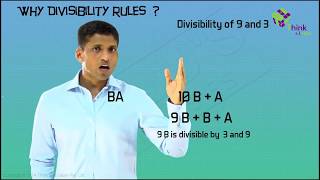The divisibility rule of 3 helps to check whether the given number is divisible by three or not. For small numbers, we can easily conclude the divisibility by 3. In the case of larger numbers, it is not possible to check the divisibility just by looking at the numbers. Thus, we require a specific rule that can be employed for all the numbers to check for the divisibility by 3. In this article, you will learn the divisibility rule of 3, along with solved examples.
Learn: Divisibility rules
What is the Divisibility Rule of 3?
The divisibility rule of 3 states that if the sum of digits of a number is a multiple of 3, the number will be completely divisible by 3.

Click here to learn what digits and numbers are.
Proof of Divisibility Rule of 3
We can prove the divisibility rule of 3 with the help of an example.
Consider the number 4368.
Let us expand this number as given below:
4368 = 4 × 1000 + 3 × 100 + 6 × 10 + 8 × 1
= 4 × (999 + 1) + 3 × (99 + 1) + 6 × (9 + 1) + 8 × 1
= (4 × 999 + 3 × 99 + 6 × 9) + (4 × 1 + 3 × 1 + 6 × 1 + 8 × 1)
= (4 × 999 + 3 × 99 + 6 × 9) + (4 + 3 + 6 + 8)
We know that 9, 99, 999,… are divisible by 3, and thus the multiples of these numbers are also divisible by 3.
So, the divisibility of 4368 is now dependent on the sum 4 + 3 + 6 + 8.
Here, 4, 3, 6 and 8 are the digits of the number 4368.
From the above, we can say that if the sum of these digits is divisible by 3 or a multiple of 3, the number 4368 is divisible by 3.
Hence, we can conclude that if the sum of digits of a number is divisible by 3 or a multiple of 3, the number is divisible by 3.
|
Read more: |
|---|
Divisibility Rule of 3 and 9
The divisibility rules for 3 and 9 are quite similar. As defined above, if the sum of the digits of a number is a multiple of 3 or divisible by 3, then the number is divisible by 3. Similarly, if the sum of the digits of a number is a multiple of 9 or divisible by 9, then the number is divisible by 9.
Watch The Below Video to Learn More About Divisibility Rule of 3 and 9

Examples on Divisibility Rule of 3
Question 1:
Is 53472 divisible by 3?
Solution:
Given number: 53472
Let us add the digits of the given number.
5 + 3 + 4 + 7 + 2 = 21 (multiple of 3, since 3 × 7 = 21)
Therefore, 53472 is divisible by 3.
Question 2:
Check whether the number 6874 is divisible by 3.
Solution:
Given number: 6874
Let us add the digits of the given number.
6 + 8 + 7 + 4 = 25 (not a multiple of 3, since 3 × 8 = 24 but 25 = 3 × 8 + 1)
Therefore, 6874 is not divisible by 3.
Frequently Asked Questions on Divisibility Rule of 3
Write the divisibility rule of 3.
Explain the divisibility rule of 3 with an example.
Consider the number 728.
Let us find the sum of digits of this number.
7 + 2 + 8 = 17 (not a multiple of 3)
Here, the sum of digits is neither a multiple of 3 nor divisible by 3.
Hence, by the divisibility rule of 3, we can say that 728 is not divisible by 3.
How do you say whether the given number is divisible by 3?
By the divisibility rule of 3, we can conclude whether the given number is divisible by 3. So, if any number is divisible 3, then the sum of digits of such a number must be divisible by 3 or multiple of 3.
Is 81 divisible by 3?
Yes, 81 is divisible by 3. This can be justified by the divisibility rule of 3.
8 + 1 = 9 (multiple of 3)
So, the number 81 is divisible by 3.
Comments